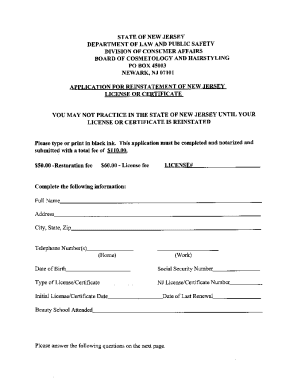
For example, you must have been qualified for at least three of the last five years to qualify for reciprocity in California. Start by calling the new state's licensing board and asking whether you qualify for reciprocity/endorsement and what the conditions are. Applying for Reciprocity or EndorsementEvery state is different. Endorsement generally permits you to bypass the new state's board examinations.

If you meet these criteria, the new state will stamp or endorse your license to say that you can legally practice in the new state. To qualify, you must hold a current cosmetology license in good standing and, as with reciprocity, the new state must agree that your home state has similar training requirements and board exams. How Endorsement WorksSome states, including Colorado and Florida, will license you by endorsement. Most times, you won't have to do additional work experience or sit another licensing exam before switching your cosmetology license to the new state. When states participate in reciprocity, it means they're satisfied that you've completed enough training hours and the exam you took was at least as rigorous as the exam set by the new state's licensing board. Cosmetology License Transfer To Colorado Airport.So, if you're licensed in Tennessee but want to work in Mississippi, you'd have to check whether the Mississippi licensing board will recognize a Tennessee license. How Reciprocity WorksSome states have a system of reciprocity for cosmetology licensing when one state allows you to work under the license of your home state. While each state has different rules, transferring your license typically means that you don't have to sit the new state's licensing exams. The second is endorsement, where the new state stamps your license as valid because you have completed an equivalent exam and training hours. The first is reciprocity, where one state allows you to work under the license of another state. If you're moving out-of-state, there are two ways to transfer your license.

Cosmetology is a regulated occupation which requires a license in all states.


 0 kommentar(er)
0 kommentar(er)
